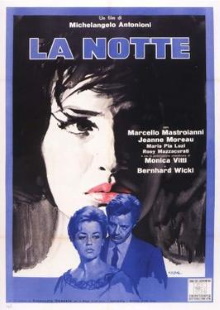My post about the previous Michelangelo Antonioni film we’ve watched, L’Avventura was not very kind to it. That was probably because I didn’t really understand it. La Notte is considered the next film of a trilogy and for a while it seemed like it would be heading the same way. Then everything clicked together during the final scene and now that I have some time to process, the more I think about this film, the more I like it. This is usually a sure sign that the film is a true masterpiece.
Acclaimed author Giovanni Pontano and his wife Lidia visit a friend Tommaso Garani who is dying in the hospital. Lidia leaves early and is later seen emotionally distraught outside. Giovanni is accosted by beautiful but mentally unsound woman in the hospital who tries to seduce him. He starts to give in but they are interrupted by nurses. He and Lidia then attend a reception celebrating his new book but Lidia slips out on her own and takes to wandering the streets. When she calls Giovanni to fetch her hours later, they talk about how they used to live in this poor neighborhood. After watching a seductive performance in a nightclub which Lidia has no interest in, they go to a party hosted by a wealthy industrialist. Giovanni is immediately attracted to the rich man’s beautiful young daughter Valentina and the silly game they play of sliding objects across a chequerboard floor draws a crowd. Meanwhile Lidia watches her husband flirt with Valentina without comment and remains listless and unsettled.
This is another film in which seemingly not much happens and everything feels dreadfully dull and boring. In fact, it’s clearly intended that the dinner party the couple go to is empty and lifeless, the conversations vapid and meaningless even to those attending. That’s why even the stupid game Giovanni and Valentina plays attracts such a crowd and why a simple spell of rain causes such a spontaneous outburst of genuine delight and laughter. Watching this, I thought that this was yet another film about apathy and jadedness. Lidia especially seems to wander around aimlessly, is uncommunicative and unengaged with the people around her. Meanwhile Giovanni seems to only be able to spare the briefest of attention for his wife and shamelessly pursues the young women he sees. Yet even that attraction is only skin deep. When Valentina says that she is trying her hand at writing something herself and plays a back a recording of what she has written, he is barely able to keep himself from falling asleep. Lidia is fully aware of her husband’s flirting and seems to feel nothing at all. I thought I sort of understood the film’s point but still couldn’t muster up much enthusiasm for it. And then comes the final scene where Lidia reveals her thoughts and all of a sudden I am forced to reevaluate everything that I have seen and realized that this indeed has been brilliant all along.
The key is that the film invites and tricks us into seeing everything from Giovanni’s perspective. It’s natural to lean towards his view of events as his half of the story seems more eventful and dramatic, with the young woman suddenly attempting to seduce him from out of nowhere and his being feted by fans and a rich tycoon. Meanwhile Lidia is being moody and difficult and so is neither as sympathetic nor as interesting a character. But as she explains, it is Giovanni’s reaction which is shocking. One of their best friends is dying in the hospital and though he visits him in the hospital, after that visit, Giovanni seems to put it entirely out of his mind and goes on with his life as usual. Meanwhile Lidia is devastated and has realized that the friend has been in love with her all along, forcing her to reevaluate her feelings for Giovanni. She is reminiscing about her past with Giovanni who in turn remains completely unmoved and passionless, while behaving and speaking only from duty and habit. Once we see things from her point of view, we can’t unsee it and her emotional reaction and actions seem much more human and sympathetic while Giovanni seems shallow and empty in comparison.
It truly is a rather strange experience to not really enjoy the film watching it but then to suddenly realize how good it is all along once you understand how everything fits together. But there is no question in my mind that this is a brilliant film. I am especially astounded in that this a film that must be read plainly instead of metaphorically. When the characters speak in abstract terms or engage in games of social standing, we really are supposed to find that boring and pretentious. There is nothing hidden or difficult to understand about this film at all, so long as we remember that the death of a treasured friend is and should be a deeply affecting tragedy.
